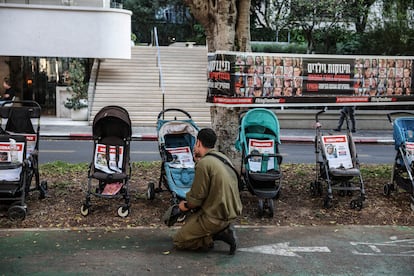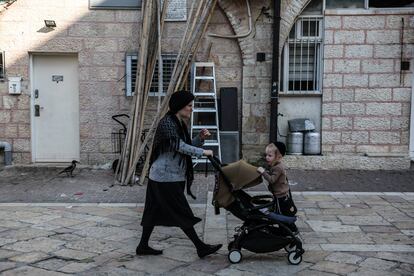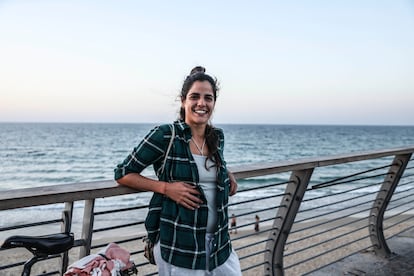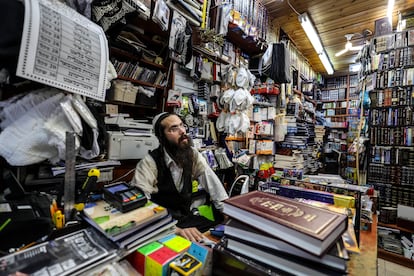Israel: A month of pain, trauma and revenge
The Hamas attack has awakened the ghost of the Holocaust and united the people, leaders and media against Gaza. Meanwhile, there is a growing discourse that criminalizes civilians in the Palestinian territory

First, shock and fear; then, pain and anger. Now, a month after Israel’s deadliest day in its 75-year history, as the army surrounds the capital of Gaza, one feeling unites the different social groups of Israel: it is time for revenge. It is the lowest common denominator that brings together the people, political and military leaders and the media, albeit to different degrees. It is the certainty that the post-Holocaust slogan, “Never again,” has become meaningful again, and that Israel has no alternative but to forcefully end the threat posed by Hamas, which killed 1,400 people on October 7.
Two things usually vary, depending on the person’s ideological position. Firsty, whether they choose to talk about “victory” — a word that covers the entrance to Tel Aviv, along with the national flag and images of soldiers — or “revenge” — which is being stoked on the roads of West Bank, where the Talmudic phrase “Rise and Kill First” is seen. And secondly, the definition of “they” — if it applies to just Hamas, Hamas supporters, all Gazans or all Palestinians. Meanwhile, life in Israel struggles to return to normal, with 200,000 Israeli troops deployed to the borders with Lebanon and Gaza, 360,000 reservists mobilized, stores closed and few smiles on the streets.
Mika Assa, 29, says that her husband is one of the reservists who have been sent to the border of Lebanon. She is concerned for his safety and has felt an “existential” fear since the October 7 attack, which she connects to the experience of her great-grandparents fleeing the Holocaust, from the Czech Republic to Sweden.
“I saw the images [of the attack] and I couldn’t believe they were real. I thought that anything could happen, that I would never be able to leave home now, that terrorists could also come here,” she says, as she walks her dog through the deserted and dark streets of the usually vibrant Yaffa, the Arab-majority town next to her native Tel Aviv. “Yes, now we have a state and a strong army, but it is the same feeling that they want to kill us and we have nowhere to go.”
In Yaffa, the City Council has put up signs in Arabic and Hebrew with the phrase, “We will get through this together,” but Assa is still uneasy. “I would be lying to you if I said I felt just as comfortable walking around with Arabs. I’m generally in favor of peace, but I see the images from Gaza and I find them less tragic than before October 7,” she admits.

But Israel is not seeing the same images of Gaza as the rest of the world. There are few images of children’s bodies or families fleeing the bombings. The media only reports news from the army about the advance of the troops or the “eliminated” Hamas leaders. TV Channel 14 has a counter which tracks all the dead Gazans (more than 10,000, as of Monday) as “terrorists eliminated.” This same channel — which is the favorite of Israel’s right wing — broadcast an interview with a military expert who claimed “there are no innocent people” in Gaza, only “2.5 million terrorists.” Two weeks ago, a military affairs correspondent said on the radio: “Make no mistake: I am in favor of 100,000 people dying [in Gaza].”
Politically, the language may be different, but the tone is the same. Israel’s President Isaac Herzog — who is condidered a more moderate voice — said it was “absolutely not true” that Gazans were not involved in or aware of the Hamas attack. “They could have risen up. They could have fought against that evil regime,” he said. “It is an entire nation out there that is responsible.”
Merav Ben-Ari, a lawmaker from the opposition Yesh Atid party, recently said in Parliament: “The children in Gaza brought it upon themselves.” And Galit Distel Atbaryan, the deputy of Netanyahu’s Likud party who until recently held the Public Diplomacy portfolio, told the Israeli Defense Forces (IDF) to act in a “vengeful and vicious” way to “erase all of Gaza from the face of the earth.” In a message on X, she posted: “Gazan monsters will fly to the southern fence and try to enter Egyptian territory or they will die and their death will be evil.”
Israel’s Heritage Minister Amichai Eliyahu, from the far-right party Amijai Eliyahu (Legacy), expressed support for using the atomic bomb in Gaza, claiming that everyone in the territory was involved in the Hamas attack. Netanyahu suspended him from ministerial ministers, but the prime minister himself has also adopted a similar tone, speaking of “a war between the children of light and the children of darkness.” He has also made references to Amalek, the enemy nation of the Israelites in the Bible who God orders to be exterminated. “You must remember what Amalek has done to you, says our Holy Bible. And we do remember,” he said.
The dehumanizing message also prevails at all levels. Defense Minister Yoav Gallant said: “We are fighting human animals and we are acting accordingly.” National Security Advisor Tzachi Hanegbi added: “It is often said that they are animals, but whoever has a dog at home knows that they are not animals, they are monsters.” While Gilad Erdan, Israel’s ambassador to the U.N. who caused controversy by wearing the Star of David that the Nazis forced Jews to wear, said: “There is only one solution to curing a cancer and it is the evisceration of the cancerous cells.”
The scale of the Hamas attack has awakened the specter of the Holocaust. As if the hours waiting for the security forces to arrive on October 7 had made the inhabitants of the most powerful state in the Middle East — which has militarily occupied the West Bank for half a century, nuclear weapons and the support of the United States — see themselves as a helpless child in a Warsaw ghetto.
Osher Yanah, a 25-year-old traditional Sephardi, explains this feeling from the Tel Aviv shop-cafe that he runs. “We are used to having people who hate us, but we did not expect something like this. The first two days I didn’t recognize my country. It wasn’t the one I had grown up in,” he says. “We lost self-esteem. But, as they say: ‘Weak people make hard times and hard times make strong people.’”
Yanah argues that “the children of [the war in] 2014, whom they told us not to harm, are the terrorists of 2023.” “They don’t want Jews. Full stop. Neither in their territory, nor ours nor in that of, I don’t know, Italy […]. The only solution I see is to kill all Hamas activists, reoccupy Gaza and educate the people there in love for others and peace. Western education, like ours, not Middle Eastern.”
For Yona Levin, a 59-year-old who works in an electronics store in the Geullah neighborhood of Jerusalem, Gazans must be expelled forever. “It must be destroyed. Everyone understands today that we have to go to the end,” he says. “There is no place for them here. And if Europe wants to help, let it take them. I’ll pay for it.”
Israeli historian and writer Gideon Avital-Eppstein explains that many people in Israel are in shock. “The majority of Israelis today are in cognitive dissonance. Until recently they thought there was something resembling peace and that it was working,” he explains.
Although the attack a month ago revealed a chain of failures in Israel’s security forces, the country remains confident in the army. Less so in Netanyahu. According to a poll by the Israel Institute for Democracy, 55% of Israelis trust the former and only 7% the latter. The IDF continues to be the most valued institution in Israel, as seen in the posters supporting the troops, cheers of encouragement and their network of volunteer cooks. McDonald’s provides them with 4,000 free meals a day and a 50% discount, and a network of gas stations invites gives them free coffee.

Ariel Yuri confesses to being “in shock” at what happened, but also feels that her country “has lost its moral compass” in its response to the Hamas attack. “I still see the people of Gaza as human beings like us. My desire for peace has not been broken. I have not stopped learning Arabic, nor stopped having Palestinian friends. Of course I’m angry with the people who did that, but not with the rest of the Palestinians. That’s racism. Right now, in my country, the majority is filled with hate. And I refuse to hate.”
This hatred is being felt by two different groups in Israel: anti-Zionist ultra-Orthodox Jews (their flag burning protest caused so much uproar that it was brutally broken up by the police) and the Arab minority: the 20% who are Palestinian by identity, but Israeli by nationality.
In the first group is Shmuel Brenner, who lives in the ultra-Orthodox neighborhood of Mea Shearim, in Jerusalem, where you can see graffiti of Palestinian flags and phrases such as “Zionists = Nazis.” He is 28 years old, has four children and serves in Yiddish the customers who enter his shop selling Jewish religious items. He pays for every medical consultation and sends his children to a private school to avoid indirectly receiving a single shekel from a state that, in his opinion, should not exist until the Messiah arrives. “I am not praying for the army to win, but for Israel to disappear, which is putting us deeper and deeper into the mud.” “Yes,” he says, “the deaths [of October 7] pained me. They’re my people. But no more than the deaths in Gaza.”

Amy — who did not want to give her last name — belongs to the second group, the Palestinian minority. In Yaffa, where clashes broke out two years ago between Jews and Arabs, there is a heavy police presence and few want to speak in public. Nor on social media. According to the NGO Mosawa, 171 investigations have been opened into Palestinians with Israeli citizenship for incitment to terrorism over social media posts, such as messages that mourned the civilian deaths in Gaza.
“I understand where their pain comes from,” Amy says, “but now they treat us like we’re all Hamas. What Hamas did is not humane, but don’t I have the right to feel pain for what is happening in Gaza?” She says she doesn’t share how she feels on TikTok because “they would arrest her in minutes,” and complains that her Jewish friends complain about her not condemning the Hamas attack. “I will do it when I can also denounce what is happening in Gaza without being arrested. How can I divide my heart? Just as their hostages are there, our families are there. Here, until you wave the flag and accept even the least logical things, they don’t accept you. They don’t understand that everything is revenge. Some take revenge on others. And if the death of one child hurts you more than another, what is it if not racism?”
Sign up for our weekly newsletter to get more English-language news coverage from EL PAÍS USA Edition
Tu suscripción se está usando en otro dispositivo
¿Quieres añadir otro usuario a tu suscripción?
Si continúas leyendo en este dispositivo, no se podrá leer en el otro.
FlechaTu suscripción se está usando en otro dispositivo y solo puedes acceder a EL PAÍS desde un dispositivo a la vez.
Si quieres compartir tu cuenta, cambia tu suscripción a la modalidad Premium, así podrás añadir otro usuario. Cada uno accederá con su propia cuenta de email, lo que os permitirá personalizar vuestra experiencia en EL PAÍS.
¿Tienes una suscripción de empresa? Accede aquí para contratar más cuentas.
En el caso de no saber quién está usando tu cuenta, te recomendamos cambiar tu contraseña aquí.
Si decides continuar compartiendo tu cuenta, este mensaje se mostrará en tu dispositivo y en el de la otra persona que está usando tu cuenta de forma indefinida, afectando a tu experiencia de lectura. Puedes consultar aquí los términos y condiciones de la suscripción digital.









































